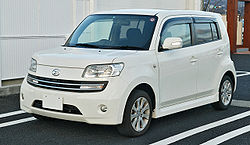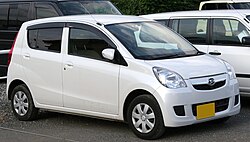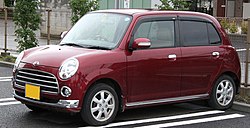Current production vehicles
| Body style | Model | Current model | Main markets | Vehicle description | ||||
|---|---|---|---|---|---|---|---|---|
| Image | Name(s) | Also called | Introduction (cal. year) | Introduction (model code) | Update/facelift | |||
| Kei car |  | Atrai | Subaru Sambar Dias | 1981 | 2021 (S700/710) | - | Japan | Up-class version of the Hijet Cargo kei microvan. |
 | Copen | Toyota Copen GR Sport | 2002 | 2014 (LA400) | - | Two-seater front-wheel-drive kei convertible sports car. | ||
 | Mira e:S | Toyota Pixis Epoch Subaru Pleo Plus | 1980 (Mira) 2011 (Mira e:S) | 2017 (LA350) | - | Entry level, low-roof hatchback kei car with hinged rear doors. | ||
 | Move | Subaru Stella | 1995 | 2025 (LA850) | - | Tall-height wagon kei car with rear sliding doors. | ||
| | Move Canbus | - | 2016 | 2022 (LA850) | - | Retro-styled kei car with rear sliding doors. | ||
 | Taft | - | 1974 (nameplate) 2020 (as a kei crossover) | 2020 (LA900) | - | Semi-tall height rugged crossover SUV-styled kei car. | ||
 | Tanto | Subaru Chiffon | 2003 | 2019 (LA650) | 2022 | Tall-height wagon kei car with rear sliding doors with an absence of a B-pillar (pillarless opening) on the left side of the car. | ||
| Kei truck |  | Hijet | Toyota Pixis Van Subaru Sambar Van | 1960 | 2021 (S700/710) | - | Japan | Rear-wheel-drive (all-wheel-drive optional), mid-engined kei commercial microvan with rear sliding doors with the emphasis on rear cargo space. |
 | Hijet | Toyota Pixis Truck Subaru Sambar Truck Daihatsu Hi-Max (Indonesia) | 1960 | 2014 (S700/710) | 2021 | Rear-wheel-drive (all-wheel-drive optional), mid-engined cab over kei pickup truck. The current generation was produced in Indonesia between 2016 and 2019 as the Hi-Max with a larger 1.0-litre engine. | ||
| Hatchback |  | Ayla | Toyota Agya/Wigo Perodua Axia (Malaysia and Singapore) | 2013 | 2023 (A350) | - | Indonesia | Budget city car (A-segment) for the Indonesian market under the Low Cost Green Car category. A slightly reengineered version for the Malaysian market is available as the Perodua Axia. |
 | Sirion | Perodua Myvi (Malaysia and Singapore) | 1998 (nameplate) 2007 (Myvi-based) | 2018 (M800) | 2022 | Indonesia | Subcompact hatchback (B-segment), a rebadged Perodua Myvi. | |
| MPV/van |  | Gran Max | Toyota Town Ace Van Toyota Lite Ace Van Mazda Bongo Van | 2007 | 2007 (S400) | 2020 | Indonesia Japan | Rear-wheel-drive (all-wheel-drive optional in Japan), mid-engined semi-cab compact van with rear sliding doors. 3-seater panel van, 8-seater and 9-seater (face-to-face third row seating) configurations are available. |
 | Luxio | - | 2009 | 2009 (S400) | 2014 | Indonesia | Up-class version of the Gran Max for the Indonesian market. | |
 | Sigra | Toyota Calya | 2016 | 2016 (B400) | 2019 | Indonesia | Three-row budget mini MPV for the Indonesian market under the Low Cost Green Car category. | |
 | Thor | Toyota Roomy Toyota Tank (until 2020) Subaru Justy | 2016 | 2016 (M900) | 2020 | Japan | Two-row boxy mini MPV with rear sliding doors. | |
 | Xenia | Toyota Avanza Toyota Veloz Perodua Alza (Malaysia) | 2004 | 2021 (W100) | - | Indonesia | Three-row compact MPV for the Indonesian market. | |
| SUV/ crossover |  | Rocky | Toyota Raize Subaru Rex (Japan) Perodua Ativa (Malaysia) | 1984 (nameplate) 2019 (as a crossover) | 2019 (A200) | - | Japan Indonesia | 'Number 5' (compact car with a width under 1,700 mm) front-wheel-drive mini/subcompact crossover SUV. |
 | Terios | Toyota Rush Perodua Aruz (Malaysia) | 1997 | 2017 (F800) | 2023 | Indonesia | Three-row, rear-wheel-drive compact SUV. | |
| Pickup |  | Gran Max | Toyota Town Ace Truck Toyota Lite Ace Truck Mazda Bongo Truck | 2007 | 2007 (S400) | 2020 | Indonesia Japan | Three-seater, rear-wheel-drive (all-wheel-drive optional in Japan), mid-engined semi-cab compact basic pickup truck. |












































